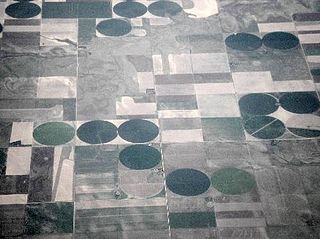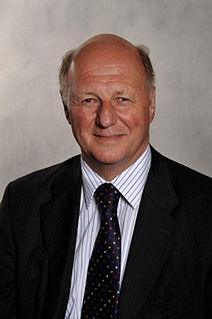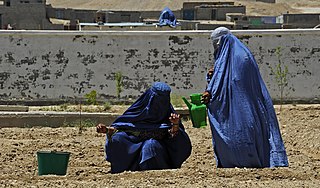
A farmer is a person engaged in agriculture, raising living organisms for food or raw materials. The term usually applies to people who do some combination of raising field crops, orchards, vineyards, poultry, or other livestock. A farmer might own the farm land or might work as a laborer on land owned by others. In most developed economies, a "farmer" is usually a farm owner (landowner), while employees of the farm are known as farm workers. However, in other older definitions a farmer was a person who promotes or improves the growth of plants, land or crops or raises animals by labor and attention.

A farm is an area of land that is devoted primarily to agricultural processes with the primary objective of producing food and other crops; it is the basic facility in food production. The name is used for specialized units such as arable farms, vegetable farms, fruit farms, dairy, pig and poultry farms, and land used for the production of natural fiber, biofuel and other commodities. It includes ranches, feedlots, orchards, plantations and estates, smallholdings and hobby farms, and includes the farmhouse and agricultural buildings as well as the land. In modern times the term has been extended so as to include such industrial operations as wind farms and fish farms, both of which can operate on land or sea.

Community-supported agriculture or cropsharing is a system that connects producers and consumers within the food system closer by allowing the consumer to subscribe to the harvest of a certain farm or group of farms. It is an alternative socioeconomic model of agriculture and food distribution that allows the producer and consumer to share the risks of farming. The model is a subcategory of civic agriculture that has an overarching goal of strengthening a sense of community through local markets.

The Women's Land Army (WLA) was a British civilian organisation created in 1917 by the Board of Agriculture during the First World War to bring women into work in agriculture, replacing men called up to the military. Women who worked for the WLA were commonly known as Land Girls. The Land Army placed women with farms that needed workers, the farmers being their employers. The women picked crops and did all the jobs that the men had done. Notable members include Joan Quennell, later a Member of Parliament, the archaeologist Lily Chitty and the botanist Ethel Thomas. It was disbanded in 1919 but revived in June 1939 under the same name to again organise women to replace workers called up to the military.

Subsistence agriculture occurs when farmers grow food crops to meet the needs of themselves and their families on smallholdings. Subsistence agriculturalists target farm output for survival and for mostly local requirements, with little or no surplus. Planting decisions occur principally with an eye toward what the family will need during the coming year, and only secondarily toward market prices. Tony Waters, a professor of sociology, defines "subsistence peasants" as "people who grow what they eat, build their own houses, and live without regularly making purchases in the marketplace."

The Ministry of Agriculture, Fisheries and Food (MAFF) was a United Kingdom government department created by the Board of Agriculture Act 1889 and at that time called the Board of Agriculture, and then from 1903 the Board of Agriculture and Fisheries, and from 1919 the Ministry of Agriculture and Fisheries. It attained its final name in 1955 with the addition of responsibilities for the British food industry to the existing responsibilities for agriculture and the fishing industry, a name that lasted until the Ministry was dissolved in 2002, at which point its responsibilities had been merged into the Department for Environment, Food and Rural Affairs (Defra).
Berry is a small Australian village in the Shoalhaven region of the New South Wales South Coast, located 143 km (89 mi) south of the state capital, Sydney. It has many historical buildings which are listed on the New South Wales Heritage Register. Berry attracts many tourists who come to enjoy the diversity of landscapes, including coastal beaches, rich dairy farming, and forested mountains. The village hosts a local Produce Market which is held twice each month on the second Saturday and fourth Sunday. Together with Kiama 23 km (14 mi) to the north, Berry acts as a gateway through to other towns and villages along the South Coast of NSW via the Princes Highway and the South Coast railway line. Major highway building projects in and around Berry have now bypassed the village, creating uninterrupted motorway conditions for coastal travel south to Nowra and the South Coast and north to Wollongong and Sydney. This has resulted in the removal of all but local and visitor traffic within the village. Planning is underway to create a pedestrian-friendly precinct in and around Queens Street.

Sir James Edward Thornton Paice, DL is a Conservative Party politician in the United Kingdom. He was the Member of Parliament (MP) for South East Cambridgeshire between 1987 and 2015, when he stood down from parliament. He was the Minister of State at the Department for Environment, Food and Rural Affairs from 2010–2012 until being removed in the 2012 government reshuffle.

Urban agriculture,urban farming, or urban gardening is the practice of cultivating, processing, and distributing food in or around urban areas. It encompasses a complex and diverse mix of food production activities, including fisheries and forestry, in many cities in both developed and developing countries. Urban agriculture is also the term used for animal husbandry, aquaculture, urban beekeeping, and horticulture. These activities occur in peri-urban areas as well. Peri-urban agriculture may have different characteristics.

Hazel Osborne Byford, Baroness Byford, is a retired member of the House of Lords, where she served as Opposition Parliamentary Spokesman for Food, Farming and Rural Affairs from 1997 to 2007. She sat as a Conservative.

Federated Farmers of New Zealand is a lobby and advocacy group for all farmers: arable including fruit and vegetables, dairy and meat and their often remote communities. It has a network of 24 regional organisations and six industry groups. Federated Farmers lobbies on farming issues both nationally and within each region. Membership of the organisation is voluntary, and at 2021 it has over 13,000 members.

Pastoral farming is aimed at producing livestock, rather than growing crops. Examples include dairy farming, raising beef cattle, and raising sheep for wool. In contrast, arable farming concentrates on crops rather than livestock. Finally, mixed farming incorporates livestock and crops on a single farm. Some mixed farmers grow crops purely as fodder for their livestock; some crop farmers grow fodder and sell it. In some cases pastoral farmers are known as graziers, and in some cases pastoralists. Pastoral farming is a non-nomadic form of pastoralism in which the livestock farmer has some form of ownership of the land used, giving the farmer more economic incentive to improve the land. Unlike other pastoral systems, pastoral farmers are sedentary and do not change locations in search of fresh resources. Rather, pastoral farmers adjust their pastures to fit the needs of their animals. Improvements include drainage, stock tanks, irrigation and sowing clover.

In New Zealand, agriculture is the largest sector of the tradable economy. The country exported NZ$46.4 billion worth of agricultural products in the 12 months to June 2019, 79.6% of the country's total exported goods. The agriculture, forestry and fisheries sector directly contributed $12.653 billion of the national GDP in the 12 months to September 2020, and employed 143,000 people, 5.9% of New Zealand's workforce, as of the 2018 census.

Agriculture in the United Kingdom uses 71% of the country's land area, employs 1% of its workforce and contributes 0.5% of its gross value added. The UK currently produces about 60% of its domestic food consumption.
In the agricultural context, diversification can be regarded as the re-allocation of some of a farm's productive resources, such as land, capital, farm equipment and labour to other products and, particularly in richer countries, to non-farming activities such as restaurants and shops. Factors leading to decisions to diversify are many, but include: reducing risk, responding to changing consumer demands or changing government policy, responding to external shocks and, more recently, as a consequence of climate change.

Nocton Dairies is a British company which was formed by Devon farmer and cheese-maker Peter Willes and Lancashire milk producer David Barnes in order to construct an 8,100-cow dairy at Nocton Heath in Lincolnshire, objectors to which claimed that it would have been the largest in Western Europe.
A milk quota was one of the measures used by governments in the European Union to intervene in agriculture. Their purpose was to bring rising milk production under control. Milk quotas were attached to land holdings and represented a cap on the amount of milk that a farmer could sell every year without paying a levy. Milk quotas were assets and could be bought and sold or acquired or lost by other means and so there was a market for them.

Scotland's Rural College (SRUC) is a public land based research institution focused on agriculture and life sciences. Its history stretches back to 1899 with the establishment of the West of Scotland Agricultural College and its current organisation came into being through a merger of smaller institutions.

Agriculture in Wales has in the past been a major part of the economy of Wales, a largely rural country that forms part of the United Kingdom. Wales is mountainous and has a mild, wet climate. This results in only a small proportion of the land area being suitable for arable cropping, but grass for the grazing of livestock is present in abundance. As a proportion of the national economy, the importance of agriculture has become much reduced; a high proportion of the population now live in the towns and cities in the south of the country and tourism has become an important form of income in the countryside and on the coast. Arable cropping is limited to the flatter parts and elsewhere dairying and livestock farming predominate.

Women's roles in agriculture in Afghanistan have been shaped by the cultural landscape of the country. Women comprise nearly half of the farming and agricultural workforce in Afghanistan. In recent years, women have been contributing to farm work and be earning money or barter goods for their contributions.

















